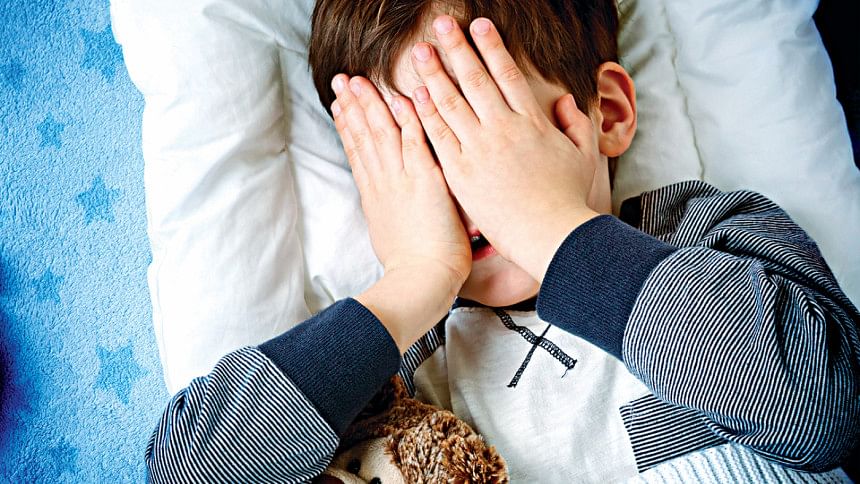Sleep problem in children

When you face any sort of sleep difficulty regularly, life becomes troublesome. But if your baby faces same problem you become apprehensive. Sleep problems in children often have an impact on the whole family.
The common sleep problems are inadequate duration of sleep, disruption and fragmentation of sleep, inappropriate sleep timing and primary disorders of excessive daytime sleepiness etc. Insufficient sleep is usually the result of difficulty initiating and/or maintaining sleep but, especially in older children it may also represent a conscious lifestyle decision to sacrifice sleep for competing priorities, such as homework and social activities.
A newborn up to first two months of age may sleep about 13-15 hours per day on an average. It may be higher in premature babies. Sleep periods are separated by 1-2 hours awake. A toddler (1-3 years) usually sleeps 11-13 hours on an average per day. Night time sleep average is 9.5-10.5 hours and naps for 2-3 hours. During pre-school (3-5 years) period night time sleep average is 9-10 hours and naps decrease from one nap to no nap. Average sleep period in middle childhood (6-12 years) is 9-11 hours and in adolescence (>12 years) is 7-8 hours.
The underlying causes of sleep disorder are extremely individualised. Some baby may have anatomical problem (like obstructive sleep apnoea, diseases in any part of respiratory tract etc.) while others may have developmental issues. Some drugs and food habits (caffeine, beverages, junk food etc.) have negative impact on sleep. Social disharmony, chaos and sound pollution are among the increasing problems. Media and electronics are emerging as social quandary now. Sometimes physician do not even find any obvious cause of sleep disturbances.
Now let us discuss how can we solve these problems. The following recommendations come from the American Academy of Paediatrics for the infants:
• Not to share bed in the 1st year of life, instead encourage proximate but separate sleeping surfaces for mother and infant
• Place the baby on his/her back to sleep at night and during nap times
• Place the baby on a firm mattress with a well-fitting sheet in a safety-approved crib
• Do not use pillows or comforters
• Make sure the baby's face and head stay uncovered and clear of blankets and other coverings during sleep
Parents should know some basic principles of healthy sleep for children. For example, you may have a set bedtime and bedtime routine for your child; bedtime and wake-up time should be about the same time or not more than one hour differed on school nights and non–school nights and make the hour before bed shared quiet time.
Avoid high energy activities, such as rough play and stimulating activities, such as watching television or playing computer games, just before bed; do not send your child to bed hungry. A light snack (such as milk and cookies) before bed is a good idea. Heavy meals within an hour or 2 of bedtime, however, may interfere with sleep; make sure your child spends time outside every day, whenever possible, and is involved in regular exercise.
Exposure to sunlight helps to keep your body's internal clock on track; keep your child's bedroom quiet and dark. A low-level night light is acceptable for children who find completely dark rooms frightening; Keep your child's bedroom at a comfortable temperature during the night; Do not use your child's bedroom for time-out or punishment and keep the television out of your child's room. Children can easily develop the bad habit of 'needing the television to fall asleep.
In various studies it is found that sleep disturbance in childhood is a culprit to developmental delay, academic backwardness, health problem and familial or social disharmony. Parents should sacrifice their habit of using social media, internet or television till midnight in favor of their children. Spend quality time with the children. Resolving sleep problem can ensure your children a healthier, brighter and confident future.
The writer is a Registrar at the Institute of Child and Mother Health (ICMH), Dhaka.
E-mail: [email protected]

 For all latest news, follow The Daily Star's Google News channel.
For all latest news, follow The Daily Star's Google News channel. 






Comments